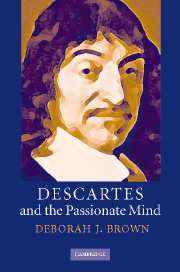Book contents
- Frontmatter
- Contents
- Acknowledgements
- Note on references
- Introduction
- 1 Volo ergo sum: the unity and significance of Les Passions de l'âme
- 2 Perturbations or sweet pleasures? Descartes' place in two traditions regarding the passions
- 3 The natural integration of reason and passion
- 4 Representing and referring
- 5 Action and passion: metaphysical integrationism
- 6 Wonder and love: extending the boundaries of the Cartesian knower and the Cartesian self
- 7 Several strange passages on desire and fortune
- 8 Generosity breeds content: self-mastery through self-esteem
- Bibliography
- Index
1 - Volo ergo sum: the unity and significance of Les Passions de l'âme
Published online by Cambridge University Press: 15 December 2009
- Frontmatter
- Contents
- Acknowledgements
- Note on references
- Introduction
- 1 Volo ergo sum: the unity and significance of Les Passions de l'âme
- 2 Perturbations or sweet pleasures? Descartes' place in two traditions regarding the passions
- 3 The natural integration of reason and passion
- 4 Representing and referring
- 5 Action and passion: metaphysical integrationism
- 6 Wonder and love: extending the boundaries of the Cartesian knower and the Cartesian self
- 7 Several strange passages on desire and fortune
- 8 Generosity breeds content: self-mastery through self-esteem
- Bibliography
- Index
Summary
Until fairly recently, Les Passions de l'âme was a work relatively ignored in Cartesian scholarship. This may seem unsurprising given that it can appear as a hodgepodge of antiquated micromechanical explanations of the causes and symptoms of the passions, psychotherapeutic techniques and underdeveloped ethical claims. It is divided into three parts, the first part of which is concerned primarily with defining the passions, the second with expounding, somewhat tediously, the classification, physiological nature, functions and symptoms of the six principal passions (wonder, love, hatred, desire, joy and sadness) and the third with laying down an account of virtue while making further taxonomical divisions among the secondary passions. In the space of one short book, Descartes grafts together the three principal ‘branches’ of knowledge described in the preface to the French edition of the Principles – medicine, mechanics and morals – without, it seems, any clear strategy for integrating them.
The treatise on the passions seems remote in this regard from the work of the Meditations, the root system of Descartes' tree of knowledge, which has an obvious unity and works towards the clearly defined goal of establishing the metaphysical and epistemological foundations for science (AT vii, 17). In a prefatory letter to the Passions, Descartes asserts that he intends not to approach the passions as either an orator or moral philosopher but ‘en physicien’, as a natural philosopher or physicist (AT xi, 325).
- Type
- Chapter
- Information
- Descartes and the Passionate Mind , pp. 11 - 27Publisher: Cambridge University PressPrint publication year: 2006



